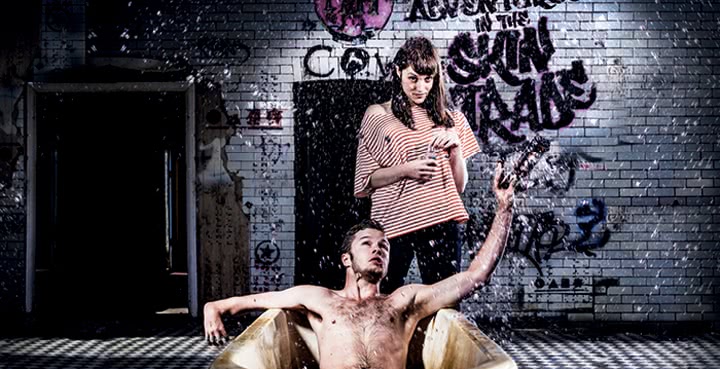In 2012, the Sydney Opera House was home to a breathtaking production. It enraptured the ear with bewitching prose and luscious voices, with simple props and a sprawling, stunning cast.
That production was Under Milk Wood, Dylan Thomas’ revered ‘play for voices’. Now, the Opera House is once again inviting the lyrical delight of Thomas beneath the sails with his unfinished bildungsroman, Adventures In The Skin Trade. It has been adapted by the delightful playwright Lucy Gough, whose commitment to staging the spirit of Thomas is paramount.
“Well, [director] Kevin Lewis and I had spoken about doing it, but then having read it a few times, I started to get quite worried,” Gough chuckles. “It’s bonkers, actually, and it’s also very much an interior monologue. When I first read it, I thought, ‘Fantastic, it jumps off the page!’ But when I actually started to get into it, I suddenly wasn’t all that sure how to articulate this interior voice without it being one long monologue, which can be good, but can also be really, really tedious. But then I came up with the idea of these sort of harpy figures, who articulate thoughts and inhabit the world. They aren’t in the book, but I think they are very much in the spirit of the book. It’s not my job to change what’s there, but to give it new life in a different form.”
Though familiarity with the Welsh author is in no way necessary to fully engage with the play, those who have read Thomas before are primed to expect some of the most poetic, engrossing language of the last hundred years. Thomas was a master of voice, and the fact that Gough has been able to reach a level of creative and emotional comfort in undertaking an incomplete story speaks very loudly of the strength of her craft.
“There was certainly a lot of hard work,” she says. “I very carefully read a lot of biographies as well as Dylan Thomas’ actual work, so I could feel like I really got inside his mind. From there I started to unpick the work, and as I’m a writer myself, that was my point of view, as a carpenter might look to understand how somebody else made a certain table. To find repeated rhythms, things that might suggest how this could all end, because of course he never finished it. So I was trying to find a pattern. But also I came across a letter where he was talking to someone about writing this, saying how he planned to end it. That was extremely useful, and some of that letter itself is now in the play.”
While there will inevitably be certain overlaps between this and Thomas’ better-known works, Adventures In The Skin Trade remains rather unique. It is unfinished, yes, but also portrays the author at his reflective best, conjuring memories of adolescence and confusion, yet presented with streaks of humour and fantasy.
“It certainly stands upon its own,” says Gough. “It’s an early work, and what I love about it is this difference to his other writing. It’s very much about being a young man, about trying to grow up and make your first steps into the world. It’s also wonderfully surreal but very truthful. It captures that transition into adulthood in such a remarkable way. It’s joyfully bonkers and funny, but also at moments so very touching. I’ve been very careful to keep a true narrative, though. I think you’ll connect no matter what your familiarity with Dylan Thomas is – his craftsmanship was so poetic. It will certainly make you want to read more.”
Catch Adventures In The Skin Trade at the Studio, Sydney Opera House running Friday July 31 – Sunday August 2


































